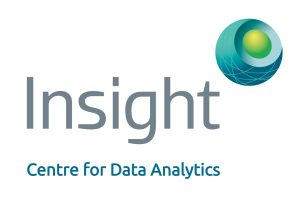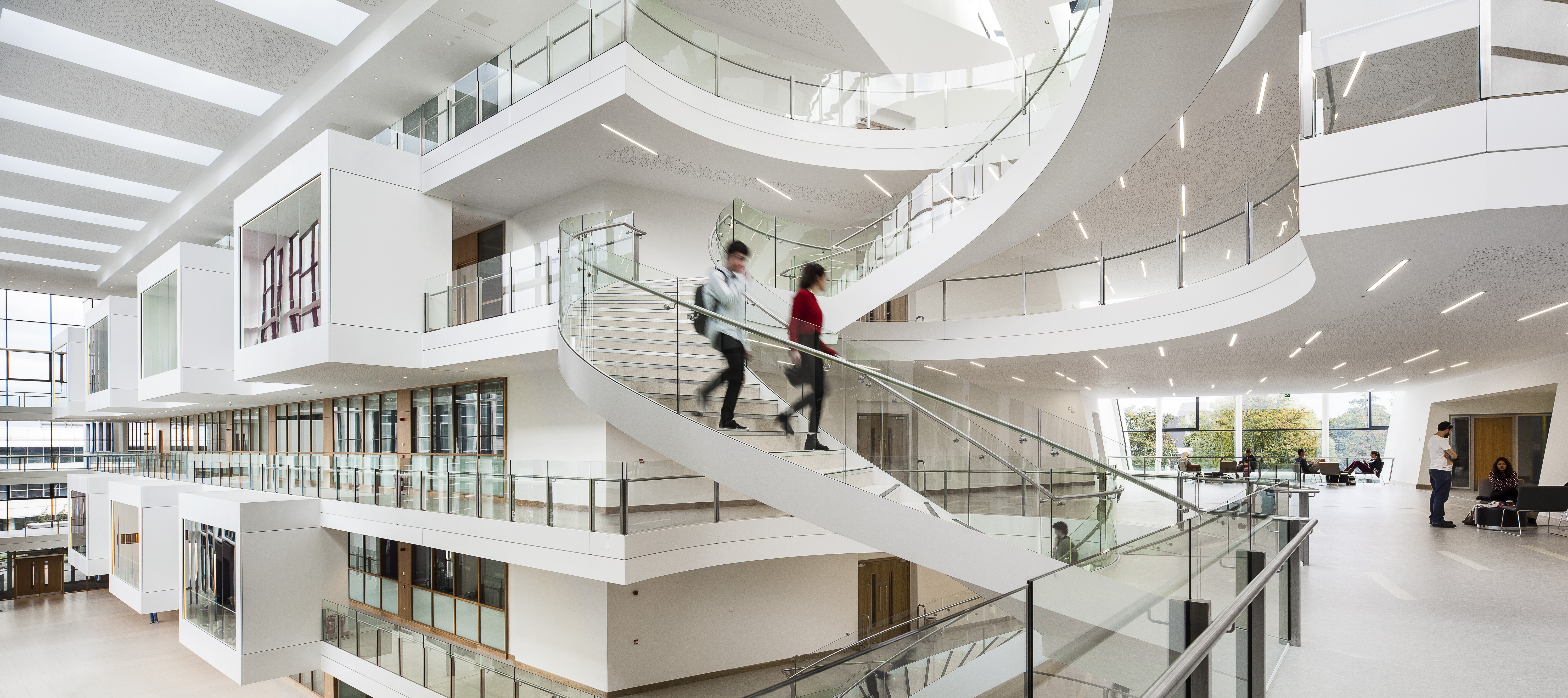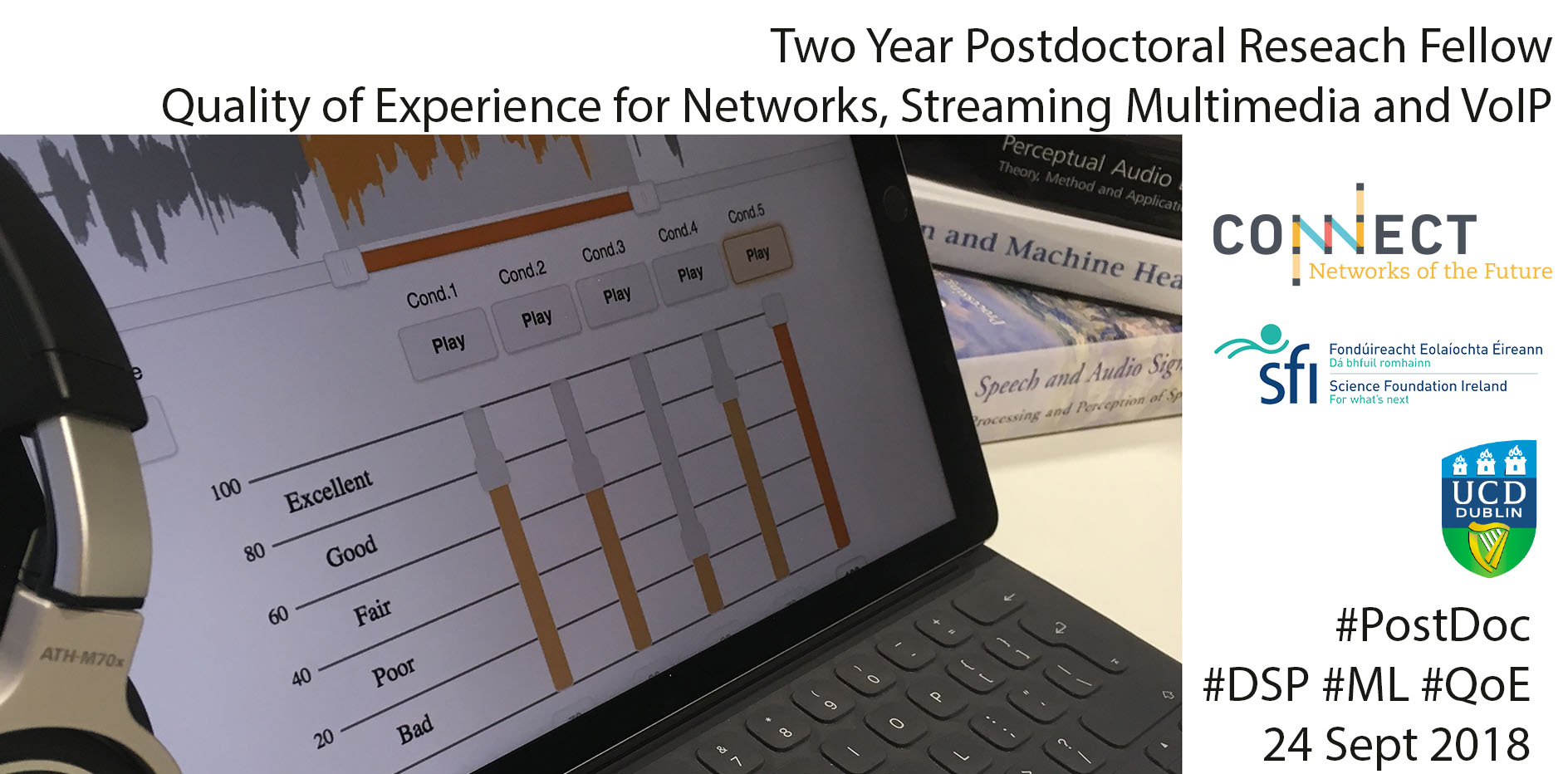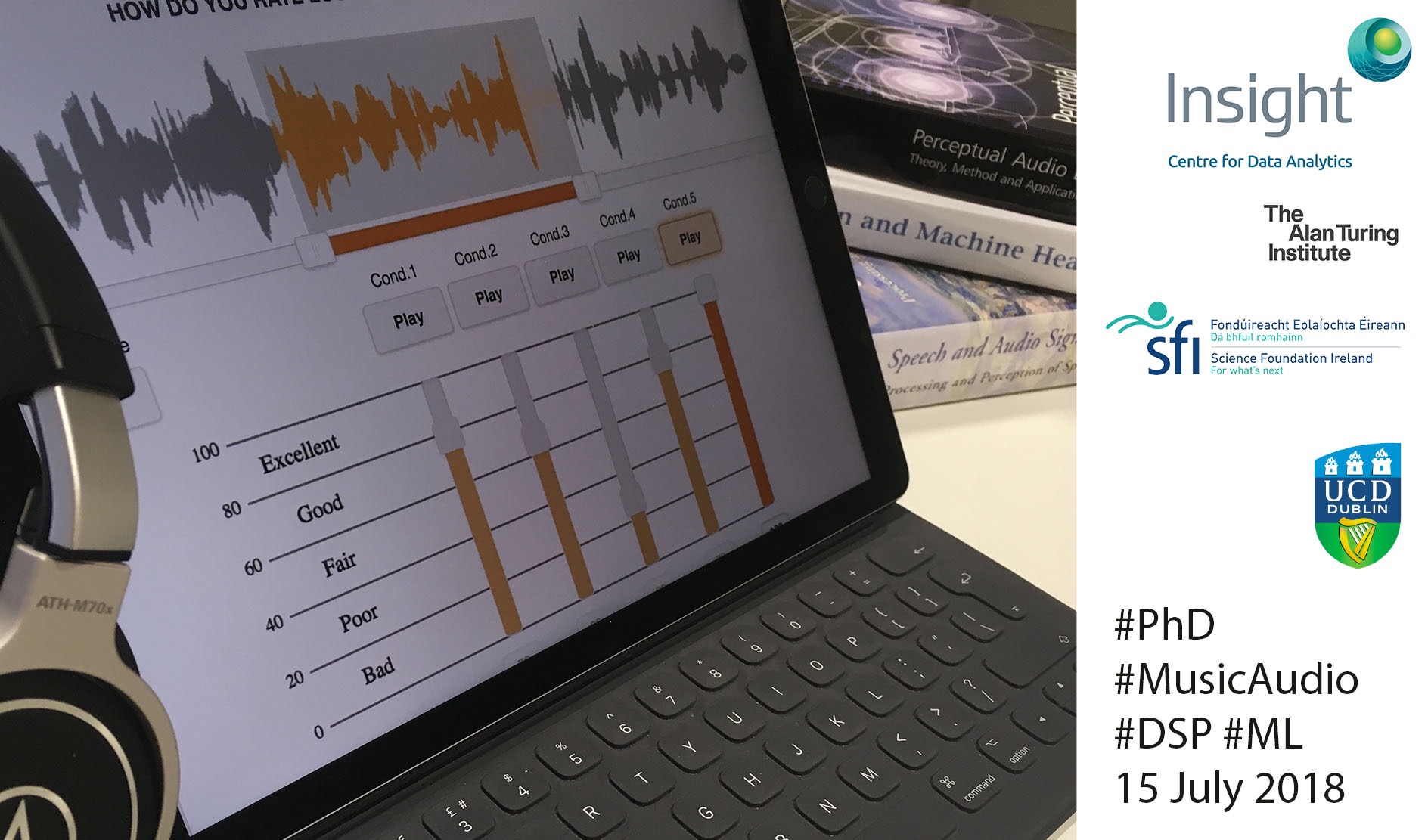Interesting in joining QxLab?
Two roles at Research Fellow Level 1 (Reference #: 015126) and Research Fellow Level 2 (Reference #: 015127) are currently being advertised.
For full details and to apply go to the UCD HR vacancies website with this link and use the reference number to search for the full job description.
Closing date: 17:00hrs (local Irish time) on 19th October 2022
Informal Enquires to: andrew.hines@ucd.ie
|
Reference #: 015126 UCD Post doctoral Research Fellow Level 1, UCD School of Computer Science, Temporary 24 Months |
|||
|
QxLab at UCD is seeking to recruit a Postdoctoral Researcher to work Data Driven Models for Media QoE. The researcher will be based in UCD in the school of computer science.
This is a 2-year position.
The successful candidate will, under the direction of the PI, help lead research work, setting a research agenda, guiding and tutoring the PhD candidates and students. The candidate will help lead work on the design and development of Quality of Experience prediction models for targeted use cases using data driven machine learning techniques, developing new or advanced research skills associated with the research project, publishing in top level peer-reviewed academic venues. The successful candidate will also play a lead role in developing and executing a programme of research and scholarship under the supervision and direction of the Principal Investigator, including grant proposal development.
This is a research focused role, where you will conduct a specified programme of research supported by research training and development under the supervision and direction of a Principal Investigator.
The primary purpose of the role is to further develop your research skills and competences, including the processes of publication in peer-reviewed academic publications, the development of funding proposals, the mentorship of graduate students along with the opportunity to develop your skills in research led teaching.
In addition to the Principal Duties and Responsibilities listed below, the successful candidate will also carry out the following duties specific to this project:
● QxLab works in collaboration with industry partners. The candidate will be expected to engage with and provide reports, updates and presentations.
Salary Range: €39,522 – €45,609 per annum
Appointment on the above range will be dependent on qualifications and experience
Closing date: 17:00hrs (local Irish time) on 19th October 2022
Applications must be submitted by the closing date and time specified. Any applications which are still in progress at the closing time of 17:00hrs (Local Irish Time) on the specified closing date will be cancelled automatically by the system. UCD are unable to accept late applications.
UCD do not require assistance from Recruitment Agencies. Any CV’s submitted by Recruitment Agencies will be returned.
|
|
Reference #: 015127 UCD Post doctoral Research Fellow Level 2, UCD School of Computer Science, Temporary 24 Months |
|||
|
QxLab at UCD is seeking to recruit a Postdoctoral Researcher to work Data Driven Models for Media QoE. The researcher will be based in UCD in the school of computer science.
This is a 2-year position.
The successful candidate will, under the direction of the PI, help lead research work, setting a research agenda, guiding and tutoring the PhD candidates and students. The candidate will help lead work on the design and development of Quality of Experience prediction models for targeted use cases using data driven machine learning techniques, developing new or advanced research skills associated with the research project, publishing in top level peer-reviewed academic venues. The successful candidate will also play a lead role in developing and executing a programme of research and scholarship under the supervision and direction of the Principal Investigator, including grant proposal development.
This is an advanced research focused role, building on your prior experience as a post-doctoral fellow, where you will conduct a specified programme of research supported by research training under the supervision and direction of a Principal Investigator.
The primary purpose of the role is to develop new or advanced research skills and competences, on the processes of publication in peer-reviewed academic publications and scholarly dissemination, the development of funding proposals, and the supervision and mentorship of graduate students along with the opportunity to develop your skills in research led teaching.
In addition to the Principal Duties and Responsibilities listed below, the successful candidate will also carry out the following duties specific to this project:
● QxLab works in collaboration with industry partners. The candidate will be expected to engage with and provide reports, updates and presentations.
Salary Range: €46,906 – €51,035 per annum
Appointment on the above range will be dependent on qualifications and experience
Closing date: 17:00hrs (local Irish time) on 19th October 2022
Applications must be submitted by the closing date and time specified. Any applications which are still in progress at the closing time of 17:00hrs (Local Irish Time) on the specified closing date will be cancelled automatically by the system. UCD are unable to accept late applications.
UCD do not require assistance from Recruitment Agencies. Any CV’s submitted by Recruitment Agencies will be returned.
|
Closed Advertisements


Post-doctoral Research Fellow
UCD School of Computer Science, Temporary (ending 30 April 2022)
Role ID: 012679
Applications are invited for a temporary post of a UCD Post-Doctoral Research Fellow Level 1 or 2 within UCD School of Computer Science
This role a postdoctoral research fellow position will work on the Precise4Q project, in the area of Machine Learning for Health. The Precise4Q project is funded by the European Commission, and is an international collaboration between 12 academic and industry partners across Europe. The project focus on the treatment of stroke, and will create the Digital Stroke Patient Platform. This platform will enable – for the first time – personalised stroke treatment which addresses an individual’s needs in four stages of the stroke lifecycle: prevention, acute treatment, rehabilitation, and reintegration into society.
The researcher will be based in the SFI Insight Centre for Data Analytics and the UCD school of computer science. Within the Precise4Q project UCD is focused on building the predictive data-driven models that underpin the platform. The development of these models will use machine learning/deep learning techniques. Innovative aspects of this research will include the development of hybrid models and the development of models capable of predictive multiple interrelated targets.
The researcher will conduct a specific programme of research and scholarship under the leadership of the Principal Investigator. This includes: (i) a model that supports healthcare professionals to design the daily rehabilitation plans so as to maximize the patient’s cognitive and functional status on the final day of discharge; (ii) a model that can predict long-term reintegration and well-being profiles for individual patients post-rehabilitation. This is a research focused role, where you will conduct a specified programme of research supported by research training and development under the supervision and direction of a Principal Investigator.
Technical Skills: • PhD in computer science, electronic engineering or related fields. • Demonstrated experience in Machine Learning and Data Analytics • Software development skills in languages like python, R, MATLAB and relevant data analytics packages and libraries. • Expertise in designing and developing predictive models and/or recommender systems. See job description at: https://www.ucd.ie/workatucd/jobs/ for full details.
PD1 Salary range: €37,874 – €43,782 per annum
PD2 Salary range: €45,041 – €49,049 per annum
Appointment on the above range will be dependent upon qualifications and experience
Closing date: 17:00hrs (local Irish time) on 27th October 2020
Applications must be submitted by the closing date and time specified. Any applications which are still in progress at the closing time of 17:00hrs (Local Irish Time) on the specified closing date will be cancelled automatically by the system. UCD are unable to accept late applications.
This project has received funding from the European Union’s Horizon 2020 research and innovation programme under grant agreement No. 777107
Please contact andrew.hines@ucd.ie if you would like further information.
Funded PhD Positions

QxLab is currently recruiting PhD students through the Insight Centre for Data Analytics.
The project is an exciting opportunity to use cutting-edge data-driven techniques to build machine learning-based prediction models. The candidate will explore how to predict the fidelity of archive media recordings – understanding, detecting, quantifying and classifying noise and the effects of digital restoration techniques. The project will also involve developing an understanding Quality of Experience – i.e. how we form quality judgments and how we perceive media quality.
We invite applications for a PhD fellowship at the INSIGHT Centre for Data Analytics, University College Dublin. The position is funded by Science Foundation Ireland. This is a 4 year fully funded PhD position, with a PhD scholarship of euro 18,500 per year (no tax, PhD fees are paid) as well as sponsorship for conference travels.
Candidates must be highly motivated with the ability for independent and critical thought. Candidates must have a first-class honours degree or equivalent, and/or a good MSc Degree in Computer Science, Electronic Engineering, Music/Audio Technology, or a related discipline. Knowledge of machine learning, data science, digital signal processing and/or cognitive science is desirable, as well as programming experience in, e.g. Python, Matlab, C++ or similar. Experience with perceptual evaluations and user studies is desirable. Experience in research and a track record of publications is advantageous. There is scope to tailor the research to the interests and skills of the successful candidate.
Essential Skills:
Other skills and traits of an ideal candidate: intellectual curiosity; the ability to organise and prioritise their own work and organise research within the PhD timetable;
Experience:
Effective team working; excellent communication and writing skills in English; analytical skills; understanding of the research process; flexible and co-operative; self-motivated and hardworking; willingness to learn new skills; interest in music and proficiency in an instrument.
Application:
Application process:
Interested applicants are requested to submit (in pdf format):
– a Curriculum Vitae including relevant publications, experience and the name and contact details of at least 2 referees
– a one page cover letter explaining your motivations and why you think you would be the best candidate for the position.
Submissions should be sent by email with subject “QxLab-2020-PHD Application” to andrew.hines@ucd.ie.
Interviews will be carried out as suitable candidates are identified.
The preferred start date is January 2021.
These are left as examples of the types of roles QxLab has offered.
Postdoctoral Fellowship at Insight in Speech Quality Models
Expressions of interest are sought for a postdoctoral fellowship based at the Insight Centre for Data Analytics at UCD.
About the role: Working in collaboration with a global industry leading partner, this position will suit someone with strong software skills (Python), machine learning experience (e.g. TensorFlow, WaveNet) and a background in speech coding or synthesis. The position will be for 1-2 years (with the possibility of extension) starting in Q2 2019.
About the project: Developments in the application of machine learning for speech coding have produced promising results for very low bit rate coding of speech trained using deep learning models. The generatively produced speech can be subjectively rated as high quality even though differs significantly from the input speech. For example, implicit bandwidth extension in the codec can produce wideband outputs for narrowband inputs. This challenges traditional objective quality metrics: when no additional noise or channel transmission errors are added to the reference speech, the transmitted signal will have a comparably high quality copy of the original. Although the reconstructed signal is different, human listeners will often struggle to pick out the original from coded versions: they are plausible but not faithful to the original speech. An objective Speech Quality Metric should therefore rate any of these speech samples as high quality compared to each other and should ignore the subtle differences. These may be subjectively described as small nuances in speech characteristics, prosody, timbre, intonation, pitch. The model should evaluate that the speech has the same macro level structure, timing, content and speaker.
Please contact andrew.hines@ucd.ie if you would like further information.
PhD Opportunities at QxLab
If you are interested in machine learning for multimedia quality of experience or health applications for quality of life, apply via to the ML-Labs Centre. If you are interested in speech and audio applications for Augmented or Virtual Reality take a look at the D-Real Centre.
Code: 2019TUD7
Title: SoundGen: Creative and targeted sound mixing, using deep learning neural networks
Supervision Team: Susan McKeever, TUD / Andrew Hines, UCD
Description:The SoundGen project will deliver advanced state of the art techniques for advanced and effective sound generation and mixing. This work is inspired by recent developments in image neural style transfer networks for image mixing. Sounds can be represented as spectrogram images – which have proven effective as representations for sound when used with neural network classifiers. This project proposes to use spectrograms in combination with CNNs that have been trained on variety of sounds, to discover how specific feature maps of the CNN are associated with aspects of sound – similar as that of image neural style transfer networks. Read more and apply here: D-Real.
Deadline: 17 May 2019
Recruiting now for September 2019 cohort.

EDGE Postdoctoral Fellowships
Deadline: November 2018.
In conjunction with the EDGE Marie Skłodowska-Curie COFUND Action, a prestigious Fellowship is offered for experienced researchers (post-doctoral or equivalent) relocating to Ireland. EDGE also provides a training and development programme for scientific excellence, offering a unique combination of interdisciplinary research themes, career development opportunities and industry engagement to the community of Fellows we recruit.
Proposals are welcome for fellowships in the field of Quality of Experience (QoE) prediction for for speech, audio or video network applications. Proposals relating to Quality of Experience for IoT will also be considered.
To find out more about the programme consult the EDGE website. Please contact me with an introductory email if you are interested in applying.
Funded PhD Positions
Funded PhD positions are available for high calibre students through a variety of scholarships. If you are interested in joining the group as a PhD student please contact me.
The PhD programme at UCD is a structured four year full time programme. More information can be found on the school website.
UCD School of Computer Science Ph.D. Scholarships 2019

The School of Computer Science (UCDCS) is offering Scholarships to excellent candidates to pursue a Ph.D. within the School. Awardees will receive a tax-free scholarship of 16,000€/year, plus payment of Ph.D. fees at EU levels, and an allowance of 1,000€ for a PC. The Scholarships will run for up to 4 years, conditional to satisfactory progress, to be evaluated before the end of year 2.
As part of the Scholarship, awardees will be expected to serve as Research Demonstrators/Teaching Assistants within the SCS for up to 9 hours/week during teaching term.
Candidates must have a first class or upper second-class honours primary degree, or equivalent. If final degree results are not known at the moment of application, offers may be provisionally made, conditional to confirmation of results. Scholarships are to start in the 2019/20 Academic year, preferably by October 1st 2019.
Candidates should apply in conjunction with a Principal Investigator/academic member of staff from the SCS, who will be their Ph.D. supervisor if the application is successful. As such, applicants should first contact members of staff from the SCS, obtain their approval to complete a Ph.D. under their supervision, and liaise with them while preparing the application. Applications must include details of a Ph.D. research project which should be agreed between the prospective supervisor and the candidate. Candidates who are concurrently applying for other Ph.D. scholarships (for instance the Government of Ireland Postgraduate Scholarships by the Irish Research Council) will be regarded favourably.
All academic staff members from the SCS are eligible as sponsors for applicants so long as their contract is permanent or extends for the full duration of the scholarship. Everything else being equal, members with smaller research groups/lower research funding will be prioritised.
To apply for the scholarship, fill in the Application Form (docx), (odt) and submit it by email to gianluca.pollastri@ucd.ie by November 15th 2018, 5pm GMT. Prospective supervisors will be asked to confirm that they wish to support your application and your named referees will be asked for their references shortly after your submission.
We expect results to be announced in January 2019.
Recently Closed Positions


| UCD Postdoctoral Research Fellow Level 1 or Level 2, UCD School of Computer Science (Temporary) | |||
| SFI CONNECT Centre for Future Networks are looking to recruit a Postdoctoral Researcher to work in the QxLab group on projects in Quality of Experience for Networks, Streaming Multimedia and VoIP. The researcher will be based in UCD in the school of computer science.
The successful candidate will, under the direction of the PI, help lead research work, setting a research agenda, guiding and tutoring the PhD candidates and students. The candidate will help lead work on the design and development of Quality of Experience prediction models for targeted use cases using data driven machine learning techniques, developing new or advanced research skills associated with the research project, publishing in top level peer-reviewed academic venues. The successful candidate will also play a lead role in developing and executing a programme of research and scholarship under the supervision and direction of the Principal Investigator, including grant proposal development. Salary: PD1: €36,854 – €39,138 per annum; PD2: €39,138 – €40,259 per annum Closing Date: 17.00hrs (Local Irish Time) on 24th September 2018. Informal enquires contact: andrew.hines@ucd.ie |

The project is an exciting opportunity to use cutting-edge data-driven techniques to build machine learning-based prediction models. The candidate will explore how to predict the fidelity of archive music recordings – understanding, detecting, quantifying and classifying noise and the effects of digital restoration techniques. The project will also involve developing an understanding Quality of Experience – i.e. how we form quality judgments and how we perceive sound.
In collaboration with the Alan Turing Institute and Queen Mary University of London
We invite applications for a PhD fellowship at the INSIGHT Centre for Data Analytics, University College Dublin. The position is funded by Science Foundation Ireland. The research project will be carried forward in collaboration with the Alan Turing Institute (ATI) as a strategic research partner, and Queen Mary University of London. In order to facilitate this, the successful PhD candidate will be seconded and sponsored to spend up to 25% of the time at ATI in London.
This is a 4 year fully funded PhD position, with a PhD scholarship of euro 18,500 per year (no tax, PhD fees are paid) and a substantial financial support for training and exchange visits to ATI, as well as sponsorship for conference travels.
Candidates must be highly motivated with the ability for independent and critical thought. Candidates must have a first-class honours degree or equivalent, and/or a good MSc Degree in Computer Science, Electronic Engineering, Music/Audio Technology, or a related discipline. Knowledge of machine learning, data science, digital signal processing and/or cognitive science is desirable, as well as programming experience in, e.g. Python, Matlab, C++ or similar. Experience with perceptual evaluations and user studies is desirable. Experience in research and a track record of publications is advantageous. There is scope to tailor the research to the interests and skills of the successful candidate.
Essential Skills:
Other skills and traits of an ideal candidate: intellectual curiosity; the ability to organise and prioritise their own work and organise research within the PhD timetable;
Experience:
Effective team working; excellent communication and writing skills in English; analytical skills; understanding of the research process; flexible and co-operative; self-motivated and hardworking; willingness to learn new skills; interest in music and proficiency in an instrument.
Application:
Application process:
Interested applicants are requested to submit (in pdf format):
– a Curriculum Vitae including relevant publications, experience and the name and contact details of at least 2 referees
– a one page cover letter explaining your motivations and why you think you would be the best candidate for the position.
Submissions should be sent by email with subject “SFI-AudioArchivePHD Application” to andrew.hines@ucd.ie by Sunday 15th July 2018.
Interviews will be carried out as suitable candidates are identified.
The successful candidate is expected to start in September 2018.
Application End Date:
Sunday 15th July 2018
Contact:
Informal queries about this position should be sent to andrew.hines@ucd.ie.
